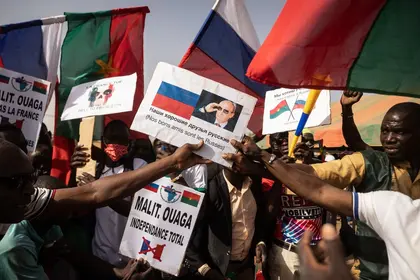Russian propaganda has led to African nations often siding with Moscow’s foreign policy, including in response to Russia’s war in Ukraine. African countries’ leanings toward Russia are not accidental – they’re the product of a long-term three-way struggle between the West, Russia and the African continent.
Ukraine’s primary tool to counter Moscow is through diplomacy and pointing out the damage Russia does on the continent, according to some analysts.
JOIN US ON TELEGRAM
Follow our coverage of the war on the @Kyivpost_official.
Back in 2021, the majority of citizens of African countries, particularly in the West and Central regions, had a positive attitude toward the Russian government, according to data published on April 13, 2022 by the Gallup Institute for Public Opinion Research.
According to the results of the survey, the average approval rating for Moscow across Africa was 42 percent, while the world average was around 33 percent.
Support for the Russian leadership is most concentrated in West Africa. For example, in Mali, 84 percent polled positively for the Kremlin.
When the first resolution of the UN General Assembly on the Russian war in Ukraine was drafted in 2014, calling for the pseudo-referendum in Crimea to be considered invalid, 24 African countries abstained from voting and 2 countries voted against.
53 percent of African countries did not support Ukraine in the resolution even though, in 2020, Ukraine had declared the Africa one of its priority regions for economic diplomacy in its national security strategy.

Moldova Residents Caught in the Middle of Gas Fight
On July 3, the online publication Svidomi published an article detailing the gradual strengthening of Russian influence on the continent of Africa.
Researchers found that over the past 70 years, the struggle “in this triangle” has taken place simultaneously in many spheres, including on the information level. They cite Russian propaganda success based on events of the last century and the Soviet policy at that time.
Soviet propaganda was effective not because of its content, but because Russia did not have its own colonies in Africa, unlike Western countries. So, for Soviet propaganda to be effective, it was enough to emphasize the racism of the United States and the colonialism of the West.
After the collapse of the USSR, the Kremlin was busy solving internal problems and showing aggression against neighboring countries seeking independence from Russian. For the next 10-15 years, Moscow used Africa as a platform for business and many African armies and industries depended on Russian goods and equipment.
The Stockholm International Institute for the Study of Peace published information showing Russia had supplied weapons to 28 African countries between 1991 and 2014.
The real value of weapons sold was only 11 percent of the total of all Russian arms exports and researchers concluded that the countries of Africa were more dependent on Russia than Russia was on them.
However, in 2008, the Kremlin took a hit in world opinion after invading Georgia. Then Moscow began investing more actively in its foreign audiences broadcasting network Russia Today.
The influence of Russian propaganda has increased significantly since the start of Russia’s initial invasion of Ukraine in 2014.
In that year, the Sputnik propaganda channel, aimed at the entire Global South, began operations. And in 2017, Russia Today launched a French-language advertising campaign and in a few months increased its audience in French-speaking countries in Africa.
After a nine-month study, the research center of the French Ministry of Defense identified 622 unique sites that worked in the interests of Russia.
With the advent of PMC Wagner and other Yevgeny Prigozhin ventures in Africa, Russia’s position has strengthened. During the attempted military coup in Russia in June 2023, Prigozhin said he was still involved in Africa, following the instructions of the Russian leadership.
Prigozhin-led organizations have added new tools to Russian propaganda. For example, at the beginning of a full-scale invasion, Prigozhin’s entities created thousands of Twitter accounts, partly run by fully automated bots, others by real people.
Peak activity of bot farms occurred during the meeting of the UN General Assembly in which the member states approved a resolution demanding the withdrawal of Russian troops from Ukraine.
They also hacked the accounts of real people, from which pro-Russian messages were posted. The Record published an article on July 6 saying the accounts of Nigerian residents were hacked on a large scale.
In another example, Proekt published an article in 2019 showing Prigozhin’s group supported eight candidates in the 2018 Madagascar presidential election at once.
In addition, Russia Today and Sputnik spread their propaganda through radio stations, printed newspapers or posters, and even through cartoons. One cartoon depicts a Wagnerian paratrooper coming to the aid of Africans in the fight against French rats.
Svidomi researchers said that although Ukraine can’t overtake Russia in the information confrontation in Africa, actions should be taken diplomatically, particularly in civil diplomacy.
"African states are independent and sovereign. They can collaborate with anyone they want,” Svidomi researchers said.
“Ukraine’s task is to demonstrate the negative consequences of cooperation with the Russian Federation, particularly in the information sphere.
“Also in Africa, there are topical issues regarding the Wagnerian war crimes in Mali, the Central African Republic and other African countries. Often, they don’t get enough attention, because they are quantitatively less than Russia’s crimes against Ukraine.
“But, drawing additional attention to these facts will allow Ukraine to potentially get more favorable support.”
You can also highlight the text and press Ctrl + Enter










